Politics
Turkish police nab 239 suspects in nationwide operations against FETÖ
The Gülenist Terror Group (FETÖ) faces a new barrage of operations as part of ongoing investigations across the country. On Tuesday, authorities captured a total of 239 suspects in separate operations against the group, which is the culprit of the July 15, 2016 coup attempt.
The biggest roundup was in an investigation into FETÖ’s infiltration into the Turkish Armed Forces (TSK). Some 158 suspects were captured while a manhunt is underway to capture 16 others in operations based on a joint investigation by the Chief Prosecutor’s Offices in Istanbul and the western city of Izmir. Security forces carried out raids in 41 provinces in the early hours of Tuesday for operations focusing on active-duty and former military officers who secretly communicated with civilian members of the terrorist group. The Chief Prosecutor’s Office in Istanbul released a statement about the operations and said that FETÖ still poses the biggest threat to the constitutional order and has yet to be undetected infiltrators in the army.
The statement said one of the most efficient investigation methods to detect FETÖ infiltrators focused on the terrorist group’s favored communications model that involves public payphones. This model involves military infiltrators contacting civilian members of the group who serve as handlers, through payphones, and arranging secret meetings. Prosecutors said the office and counterterrorism police carried out joint efforts to create a database on payphones across Türkiye and managed to conduct operations against FETÖ, both against those involved in the coup attempt and other suspects in the army whose direct ties to the attempt were not uncovered before.
Across Türkiye, a total of 1,918 operations were carried out against those suspects since 2016 and 28,262 people were identified. Some 25,869 among them were detained so far. The statement said 9,055 among them were remanded in custody, while 13,972 suspects were released with judicial control and 2,393 suspects remained at large. It also said 9,533 suspects initially detained were released when they collaborated with authorities and supplied information about FETÖ’s inner workings that ultimately led to more operations and detentions. The Chief Prosecutor’s Office said the rate of collaborators in proportion to the total number of suspects captured stood at 37%.
Those wanted in Tuesday’s operations included colonels, lieutenant-colonels and officers in lower ranks serving in the Land Forces, Air Forces, Gendarmerie Forces and Naval Forces of the army, as well as former cadets of military schools.
In another operation based on an investigation by the Chief Prosecutor’s Office in Istanbul, police detained 21 suspects, including 13 active-duty police officers. Suspects were members of a secret network of the terrorist group within law enforcement and included two “law enforcement imams” of FETÖ. “Imam” is a name given to the group’s handlers for infiltrators in the army, law enforcement or judiciary. FETÖ, which disguised itself as a so-called religious movement for years, often resorts to religious terms in its secretive jargon. Other detained suspects included six former police officers who were earlier expelled on suspicion of having links to the terrorist group. Operations were carried out in Istanbul, Ankara, Aydın, Antalya, Balıkesir, Batman, Erzincan, Gaziantep, Izmir, Kahramanmaraş, Mardin, Muğla, Samsun and Sivas.
Elsewhere, authorities launched raids in eight provinces against suspects linked to a restaurant chain that was earlier seized for funding FETÖ. Sixty suspects were detained in the operations that targeted those transferring cash to other FETÖ members, particularly those expelled from the public sector on suspicion of links to the group. Suspects are also accused of secretly hiring people under investigation for FETÖ links through secret partnership programs, in a bid to deliver cash to them.
In a nationwide crackdown in February, authorities detained dozens of suspects in connection with a döner kebab franchise, Maydonoz Döner, used to raise money for FETÖ activity. The initial findings of that investigation showed that the franchise gave illegitimate partnerships to people linked to FETÖ for a certain sum and refused to award shares to people not referred by the terrorist group. The franchise called its scheme “Reference-Based Growth” and based it on organizational trust without any official documentation. Authorities have said earlier that all branches of the chain were used to create jobs for FETÖ-linked people and funnel funds to the group, including “himmet” rates. “Himmet” is the name FETÖ gave to donations to the group or cash obtained through extortion.
In order to avoid tracking, illegal shareholders passed the money through FETÖ-linked shops such as jewelry stores via a consignment method. The franchise firm grew its business abroad with new branches, which eased the transfer of money to FETÖ members outside Türkiye. Authorities have since assigned a trustee to Maydonoz Döner following the operations.
FETÖ has faced increased scrutiny following the coup attempt that killed 251 people and injured nearly 2,200 others. Tens of thousands of people were detained, arrested or dismissed from public sector jobs following the attempt under a state of emergency.
The terrorist group faces operations almost daily as investigators still try to unravel their massive network of infiltrators everywhere, but an unknown number of FETÖ members, mostly high-ranking figures, fled Türkiye when the coup attempt was thwarted.
FETÖ still has backers in the army and civil institutions, but as operations and investigations since the coup attempt have indicated, they have managed to disguise their loyalty. FETÖ is also implicated in a string of cases related to its alleged plots to imprison its critics, money laundering, fraud and forgery.
In 2023, Türkiye’s National Intelligence Organization (MIT) found that over 3,000 infiltrators of FETÖ were still active within the Turkish National Police after spending more than six years to decipher an encrypted database seized from a top FETÖ member code-named “Garson” (“Waiter”), who was behind the group’s July 2016 coup.
Politics
Türkiye driving force in region, foreign minister says
Türkiye’s top diplomat explained what shaped the country’s foreign policies, especially in the region, as he met businesspeople and representatives of nongovernmental organizations (NGOs) in the central Turkish province of Aksaray on Sunday.
The country has emerged as a significant power broker and diplomatic actor in recent years. Its location and historic ties with regional countries further propelled its diplomatic profile. Fidan says they were pursuing a dynamic, active foreign policy that prioritized cessation of conflicts in the immediate region. “Be it exertion of force, our national security activities, counterterrorism efforts, all aim to ensure stability, peace and calm in the region,” he said.
Fidan said Türkiye was “a roof” for its nation, a strong fortress, but also provided a “shade” for many other peoples and states. “You will see when you travel abroad what Türkiye means to others. You will see that people expect a great deal from Türkiye in the Balkans, the Middle East and the Caucasus. This is normal. In every region with nation states, there is a state acting as a driving force. It has a robust industry, a strong population, good security, a free environment for businesses, education, health care and telecommunications. It takes time to provide infrastructure for a country with a population above 85 million people and such a country, whether it accepts it or not, is a natural guardian for other countries in its immediate vicinity. This is an extra responsibility for us,” he said.
“Our political movement started locally, reflected itself in foreign policy and we have to adhere to a foreign policy mindset that not only advances and prioritizes Türkiye’s own interests but brings peace and stability to the region,” he added.
The minister noted that Türkiye had new areas of engagement that went beyond trade and investment, and they were treading a political line, a delicate political balance. “When we provide even a little military assistance to countries in need from time to time, we can see the impact it has, especially in the fight against terrorism. Türkiye has extensive experience in counterterrorism. It has developed capabilities in intelligence, operational capacities and defense industry products,” the former intelligence chief said. He said their assistance to others went beyond the target countries. “For instance, when we provide support to Somalia for counterterrorism, it also influences other African countries,” he said.
Fidan said Türkiye had little support in its fight against terrorism, especially from “so-called allies in the West.” “Over the years, we saw that many of them were, even if indirectly, offering support to those against us,” he said. He stated that they adopted a new approach to regional issues. “We provide help to states in need regardless of the ethnicity of their population, or sect, religion, etc. If we can sincerely do something for those who expect support from us, we do it. When you act like this, you rise ahead in the world. Discord, instability and chaos do not spread. You contribute more to peace and stability,” he stated.
The minister also noted shifts in the dynamics of the region and their approach. “In the past, the region would await a superpower to resolve its problems. Now, we are building a culture in which we solve our own problems,” he underlined.
Politics
Turkish govt ally calls for UN peacekeepers for Gaza
Devlet Bahçeli, the head of Türkiye’s Nationalist Movement Party (MHP) and an ally of the government, has called on the United Nations to deploy peacekeepers to the Gaza Strip against Israel’s ongoing massacres.
In a strongly worded statement, Bahçeli condemned Israel’s military campaign as a “barbaric blockade” that has left Gaza’s population facing hunger, thirst, shortages of medicine and “all kinds of despicable oppression.”
He accused Israeli Prime Minister Benjamin Netanyahu of pursuing a “genocidal” plan to occupy and annex Gaza, calling it “a despicable ambition that should shock the world.”
“It is now a matter of life and death for the U.N. to take immediate action, or at least show signs of vitality and to deal a blow to the ongoing massacre and the Zionist project in Gaza with a peacekeeping force,” Bahçeli said.
The MHP leader urged the international community to act “on political, military and moral grounds” to prevent further civilian deaths, warning that any delay would have “disastrous consequences.”
He also called on Muslim countries to respond to what he described as the “groaning voices of the victims and oppressed” and to fulfill their “Islamic and humanitarian responsibilities.”
Bahçeli voiced support for Hamas, describing it as waging “an honorable struggle” to defend its homeland “with legitimate and justified reasons,” and said such resistance should receive backing from sympathetic states and organizations.
He dismissed as “unacceptable” any discussion of Israeli conditions for ending the war, framing them as terms of “annihilation.”
He also rejected what he characterized as the world’s passivity in the face of the humanitarian catastrophe, where “the buried ones are not only lifeless bodies but also humanity and human heritage.”
Bahçeli said Türkiye’s protests against Israel’s actions were “just, honorable, legal and extremely accurate,” and framed Ankara as a moral actor with the historical heritage and strategic vision to play a leading role in securing justice for the Palestinian people.
“The ambition to swallow Gaza must be thwarted,” he said, adding that a U.N. peacekeeping mission was both a “human duty” and an urgent necessity.
Politics
AK Party ‘revolution’ in Turkish politics set to mark 24 years
The Justice and Development Party (AK Party) will celebrate its 24th anniversary on Thursday. Evolved from a modest gathering of the “Movement of the Virtuous,” the party boasts a streak of successive election victories in two decades. It is credited with transforming Türkiye in the first two decades of the 2000s, from education and health care to the arts, democracy, human rights, defense industry and energy.
Nowadays, the party, under the leadership of President Recep Tayyip Erdoğan, is working toward achieving the ambitious Century of Türkiye vision, a new set of reforms aimed at enhancing Türkiye’s standing in the world and improving the lives of the Turkish nation in all fields.
Erdoğan will attend the main celebratory event at the party’s headquarters in Ankara, which will coincide with a gathering of the party’s chairs for 81 provincial offices, and make a speech. The party plans to introduce a new roadmap for the future and discuss public outreach that was recently expanded with a new campaign to explain the terror-free Türkiye initiative to the population. It will also discuss the achievements in the past 24 years.
In his speech, Erdoğan is expected to unveil new reforms set to be introduced in 2026 and issue new messages regarding the terror-free Türkiye initiative.
During the celebrations, more than four mayors from other parties are expected to switch sides to the AK Party. Some media outlets reported that two lawmakers who recently parted ways with the Future Party (GP) may join the AK Party during the event, along with several surprise names from the main opposition Republican People’s Party (CHP).
Milestones
The AK Party’s governance has brought about significant changes for the better in Türkiye, following years of coalition governments and economic uncertainties.
Garnering votes of people who suffered during the dark period that led to the so-called “postmodern” coup of 1997, the party reinstated its rights. It allowed headscarves for university students in a bid for equality for all. The ban on headscarves for middle school students was also lifted in 2014. This equality in education later expanded into the public sector, and civil servants were allowed to wear a headscarf.
Universities also flourished under AK Party governments and their numbers reached 209 with the government’s promise to have at least one university in each of the 81 provinces. Another revolutionary move was the offer of free textbooks to primary and middle school students for the first time. The AK Party governments also significantly altered the education system by introducing a 12-year mandatory education system instead of the previous eight years.
Another revolution came in the form of natural gas. The AK Party governments successfully led efforts for energy independence and security, and the Fatih drillship made a major natural gas find off the shores of the northwestern province of Sakarya, paving the way for meeting the energy needs of 3 million households. This was complemented by the discovery of 75 billion cubic meters of natural gas in another reserve, also in the Black Sea. Another significant step toward energy independence was the discovery of oil in Gabar Mountain in the southeast, leading to daily production exceeding 78,000 barrels of oil.
In health care, AK Party governments introduced Türkiye to the concept of the “city hospital.” These massive complexes, which merge specialized hospitals and offer premium services free of charge, were first opened in 2017 in the central city of Yozgat and have since spread to other cities.
Under the AK Party rule, Türkiye ensured that the nation’s will governed the country and switched to an executive presidency system shortly after implementing a new presidential system, where the public elects the president. Also in this new era, the age limit for election into Parliament was lowered to 18.
The past 24 years have also witnessed significant developments elsewhere, including the introduction of the first mass-produced locally made vehicle, Togg, the first locally made satellite, IMECE and the launch of the first Turkish astronaut into space. In the defense industry, dependence on other countries reduced from 80% to 20% and Türkiye introduced
Politics
Terror-free Türkiye commission continues work, determines members
As part of the new process in Türkiye to achieve a terror-free country, the parliamentary commission leading the process will meet for the third time on Tuesday.
Parliament Speaker Numan Kurtulmuş on Monday has asked the Justice and Development Party (AK Party), the main opposition Republican People’s Party (CHP), and the Peoples’ Equality and Democracy Party (DEM Party), to name one additional member each instead of the Good Party (IP), which did not participate in the National Unity, Fraternity and Democracy Committee. After the IP group announced its decision not to join the committee, a gap of three members emerged.
At the meeting, which will take place at 2 p.m., groups will submit proposals regarding the agenda. Commission chair Kurtulmuş will also share his own proposals with members. Deputies will also bring forward any individuals they would like the commission to hear from.
The committee, comprised of 48 lawmakers from most parties represented at Parliament, will weigh how the terror-free Türkiye initiative will proceed, especially in terms of laws and regulations regarding the status of the PKK terrorist group and its members. This may include lenient sentences for surrendering members of the group.
Although Parliament is in summer recess, the committee will continue to work without interruption. Kurtulmuş will serve as chairperson but is not eligible to vote in the committee’s voting processes. AK Party’s committee members include former Justice Minister Abdülhamit Gül. CHP’s committee members will consist of deputy parliamentary group chair Murat Emir, Deputy Chairs Gökçe Gökçen and Murat Bakan, and lawmakers from Istanbul, Diyarbakır, Ankara and Muğla. Among them are Türkan Elçi, the widow of Diyarbakır Bar Association’s former Chair Tahir Elçi, who died in 2015 in crossfire during a shootout between police officers and PKK members, and Sezgin Tanrıkulu, a prominent parliamentarian who has often made headlines for his heavy criticism of counterterrorism efforts.
The committee will not directly propose bills but will likely refer its reports to other subcommittees of Parliament, which will then discuss and vote on bills for their referral to the Parliament’s General Assembly. The General Assembly is the ultimate authority in Parliament to pass laws. Throughout its tenure, the committee will also hear statements of stakeholders involved or affected by the initiative, from the National Intelligence Organization (MIT), which monitors the PKK’s disarmament, to families of terror victims. The committee is expected to recommend amendments in counterterrorism laws and the Turkish Penal Code to accommodate the needs of the initiative, especially in terms of the situation of people convicted of terrorism or aiding and abetting the PKK.
‘Work to end by 2026’
Nationalist Movement Party (MHP) Chair Devlet Bahçeli on Sunday said that he expected all work regarding the terror-free Türkiye process would be completed by the end of the year.
According to a statement by Gülseven Media Group, with the representatives of which Bahçeli met, Bahçeli called on all political parties to support the works of the committee.
Saying that the PKK is acting in accordance with the organization’s jailed ringleader, Abdullah Öcalan’s call to dissolve opens the door for positive developments, Bahçeli added that the MHP is sincerely continuing their efforts to embody a climate of peace.
He said that the Kurdish population in Türkiye’s eastern and southeastern regions also supported the process and that this would ensure success.
Bahçeli emphasized that it is time for citizens everywhere to live in peace without the worry of terrorism.
The terror-free Türkiye initiative launched by Bahçeli had its first tangible progress in February when Öcalan accepted Bahçeli’s call and urged the group to lay down its weapons. In May, the PKK announced it would dissolve itself. Last month, some 30 PKK members, including a senior leader, burned their weapons in a ceremony in northern Iraq. Although symbolic, the gesture marked the first time that the group had laid down arms in its campaign of violence for more than four decades.
Politics
Azerbaijan, Armenia share text of peace deal signed in Washington
Azerbaijan and Armenia on Monday released the full text of their peace agreement, signed Friday during a U.S.-brokered trilateral summit in Washington.
According to the 17-point document shared by their foreign ministries, both countries recognized the borders of the Azerbaijani and Armenian republics in the Soviet Union as the boundary between the two states.
Both Baku and Yerevan confirmed that they do not have any territorial claims against one another and will not raise such claims in the future, the document noted.
It said that the two sides will refrain from using or threatening to use force against each other’s territorial integrity or political independence, and from interfering in each other’s internal affairs.
It further said that both countries will establish diplomatic ties once they exchange “instruments of ratification,” and conduct negotiations to delimit and demarcate their border.
Armenia and Azerbaijan agreed not to deploy any third-party forces along their border, it added.
The document also said both countries agreed to establish a bilateral commission to oversee the implementation of the peace deal, and withdraw mutual claims in international courts within a month after the deal enters into force, among other matters.
“The present Agreement is concluded in the Azerbaijani, Armenian, and English languages, with all three texts being equally authentic. In case of divergence as to the meaning of a provision under any of the authentic texts, the English text shall prevail,” it added.
The peace agreement between the two countries was signed on Friday by their foreign ministers amid a trilateral summit between Azerbaijani President Ilham Aliyev, U.S. President Donald Trump, and Armenian Prime Minister Nikol Pashinyan at the White House, formally ending over three decades of conflict.
Armenia and Azerbaijan have fought a series of cross-border wars since the late 1980s, including most recently in 2023, when Azerbaijan liberated its territory of Karabakh.
Politics
Erdoğan marks 11 years in power as first publicly elected president
A constitutional amendment that ended the largely ceremonial role of the president boosted President Recep Tayyip Erdoğan’s place in the annals of Turkish democracy. The charismatic leader whose party has won successive elections since 2002 marks 11 years in power on Sunday, as the first president directly voted into office by the nation.
During Erdoğan’s tenure as democratically elected president, Türkiye has weathered several crises and raised its diplomatic profile as a significant power broker and a force to reckon with, from mediating crises between Ethiopia and Somalia to the conflict between Russia and Ukraine and giving a powerful voice to Türkiye against Israel’s attacks on Gaza. At home, Erdoğan mobilized the nation and steered the recovery after the “disaster of the century” or earthquakes that killed tens of thousands of people in southern Türkiye in February 2023. Most recently, the People’s Alliance under the leadership of Erdoğan embarked upon an ambitious plan to disarm the PKK and end decades of violence by the terrorist group.
It was a rough path for Erdoğan, who himself and his party faced numerous challenges over the past two decades, but ultimately, the public’s will for true democracy won. Erdoğan had to wait seven years for the first direct presidential election, following a 2007 amendment that changed the election rules and was approved by a public referendum. Before the amendment, the presidency was a ceremonial role and Parliament elected the president. Opposition parties initially opposed the arrangement, but when the election date neared, they fielded their own candidates one after another. Erdoğan, the candidate of his Justice and Development Party (AK Party), was challenged by former Organisation of Islamic Cooperation (OIC) Secretary-General Ekmeleddin Ihsanoğlu, who was supported by the majority of opposition parties, and Selahattin Demirtaş, co-chair of the now-defunct Peoples’ Democratic Party (HDP).
Erdoğan secured more than 51.7% of the vote, becoming the 12th and first directly elected president of the Republic of Türkiye. Three years later, he won another victory for further changes to the presidential system, when more than 51% of the voters approved the executive presidency system, granting more powers to the president in a 2017 referendum. In 2018, another presidential vote was held, this time pitting Erdoğan against more challengers, but the veteran politician managed to beat his rivals again. His last election was in 2023 and Erdoğan etched his name in the annals of Turkish democracy again by defeating Kemal Kılıçdaroğlu, the joint candidate of a six-party opposition bloc, although this time in a runoff vote.
In a social media post on Sunday, AK Party’s deputy chair, Efkan Ala, marked the day and said the era of running Türkiye “without public consent” was “over.” “The irade is now idare,” he said, using Turkish words for “will” and “administration” respectively.
The presidency in its original form was a powerful authority, as evidenced during the tenure of Mustafa Kemal Atatürk, the country’s first president and founder of the Republic of Türkiye. His successor, Ismet Inönü, was branded as “National Chief” for his immense power that even continued when his Republican People’s Party (CHP) was in opposition. But after the 1960 coup that ousted President Celal Bayar from power, it became a mere symbol of “authority” without any real power, while the post of prime minister evolved into the actual seat of governance. The post only had its influence when former army chief Kenan Evren launched a coup in 1980 and installed himself as president. Before and after that coup, prime ministers and presidents rarely aligned, and this separation was most evident during the tenure of Ahmet Necdet Sezer, who infamously clashed with then-Prime Minister Bülent Ecevit in 2001 during a National Security Council meeting, paving the way for an economic crisis.
Ala said Erdoğan’s election was a turning point in Turkish history, marking a revolution that eliminated the shadow of “tutelage.” He was referring to the influence of a political and military elite that had threatened with a coup and occasionally succeeded in launching it in the past, whenever they felt their interests were threatened.
“This reform led by the AK Party strengthened national sovereignty, reinforced democratic representation and put the nation’s approval at the heart of politics. Decisions, authority and responsibility now are being shaped directly by the will of they people,” Ala said.
“National will is the strongest foundation. This step ensured that Türkiye continues its path stronger and decisively. We turned the page on the crisis stemming from the presidential elections,” he said.
-
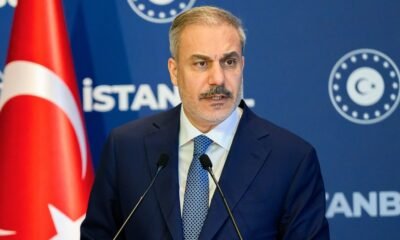
 Politics3 days ago
Politics3 days agoTurkish FM Fidan to visit Egypt to discuss Israel’s Gaza plan
-
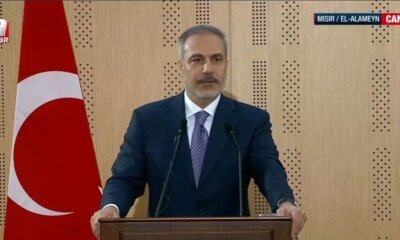
 Daily Agenda3 days ago
Daily Agenda3 days agoForeign Minister Fidan: Israel persistently sabotes cease -fire initiatives
-
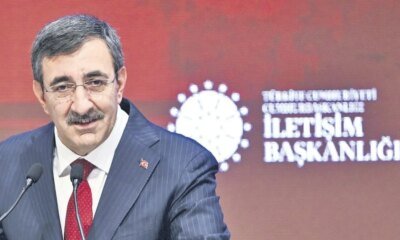
 Daily Agenda3 days ago
Daily Agenda3 days agoVice President Yılmaz: To create a chaos environment for their purpose
-
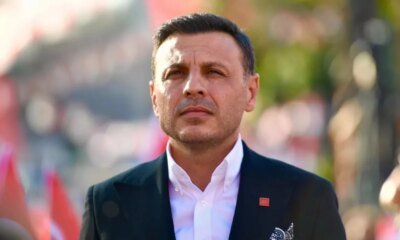
 Daily Agenda3 days ago
Daily Agenda3 days agoLawyer Mehmet Yıldırım and CHP Provincial Chairman Özgür Çelik Came Out
-
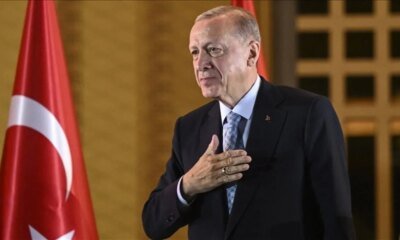
 Daily Agenda3 days ago
Daily Agenda3 days agoThe first President Erdoğan chosen by the public completed 11 years in office
-
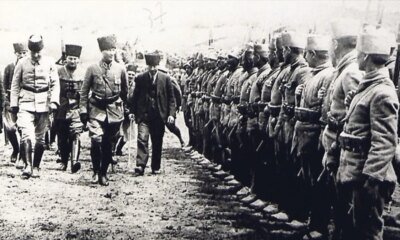
 Daily Agenda1 day ago
Daily Agenda1 day agoVictories Month August – Breaking News
-

 Economy22 hours ago
Economy22 hours agoTürkiye secures $1.8B foreign financing for strategic southeast project
-

 Refugees19 hours ago
Refugees19 hours agoTurkey detains constructor after building collapses in earthquake




